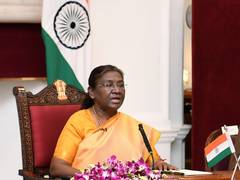PM Modi spends time at tea garden in Assam, promotes tourism around it
Guwahati (Assam) [India], March 9 (ANI): Prime Minister Narendra Modi, who is currently on a two-day visit to Assam, took some time out from his tour to spend some time at a tea estate.
Taking to his X handle, he urged tourists to visit Assam’s tea gardens during their visits to the state.
“Assam is known for its splendid tea gardens, and Assam Tea has made its way all over the world. I would like to laud the remarkable tea garden community, which is working hard and enhancing Assam’s prestige all over the world,” the X post read.
The tea community in Assam, which comprises a sizeable portion of the state’s population, plays a critical role in dozens of Assembly constituencies.
Assam’s lush tea gardens have more to offer to the world than just the beverage itself.
Assam produces nearly 700 million kg of tea annually and accounts for around half of India’s overall tea production.
Tea plantation in Assam has come a full circle as thousands of small farmers have taken to growing the crop, primarily shifting from paddy. The tea plantation business has seen unemployed youths taking up tea cultivation as a business venture. Some even cultivate it in their backyards , while many have started their tea stories through startups.
A stay in the tea garden, playing golf and driving through tea estates could be some unforgettable experiences. This beautiful state has sprawling lush green tea estates with old-world bungalows, most of which have golf courses attached to them. Besides classical clubhouses for post-golf sessions, some of these estates have even airstrips for tourists to arrive and take off in chartered aircrafts.
Tea growers in Assam are celebrating the plantation industry reaching a crucial milestone of 200 years. Tea estates around plantations, hitherto unexplored and unpicked, in the state’s upper reaches first came to be established way back in 1823.
Renowned globally for its richly coloured and aromatic tea, Assam’s tea industry, which is the country’s largest, provides livelihoods to millions with many others directly or indirectly dependent on the plantations. The state is famed for both Orthodox as well as the CTC (Crush, Tear, Curl) varieties of tea.
In 1823, Robert Bruce discovered wild tea plants growing wild in the upper Brahmaputra Valley. Subsequently, a tea garden was started by the government in 1833 in the erstwhile Lakhimpur district.
Today, Assam now produces nearly 700 million kg of tea annually and accounts for around half of India’s overall tea production. The state also generates annual foreign exchange earnings estimated at an equivalent to Rs 3,000 crore.




